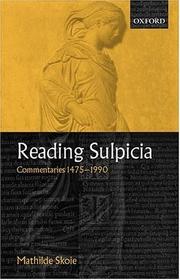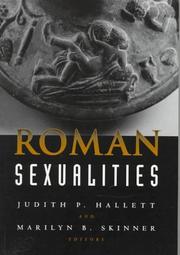| Listing 1 - 7 of 7 |
Sort by
|
Book
Year: 1911 Publisher: Paris : Alcan,
Abstract | Keywords | Export | Availability | Bookmark
 Loading...
Loading...Choose an application
- Reference Manager
- EndNote
- RefWorks (Direct export to RefWorks)
Latin language --- Elegiac poetry, Latin --- Metrics and rhythmics. --- History and criticism. --- Tibullus --- Sulpicia, --- Lygdamus. --- Versification.
Book
ISBN: 9783868219418 3868219412 Year: 2022 Publisher: Trier WVT, Wissenschaftlicher Verlag Trier
Abstract | Keywords | Export | Availability | Bookmark
 Loading...
Loading...Choose an application
- Reference Manager
- EndNote
- RefWorks (Direct export to RefWorks)
Elegiac poetry, Latin --- History and criticism --- Tibullus. --- Sulpicia, --- Criticism and interpretation.

ISBN: 0199245738 9780199245734 Year: 2002 Publisher: Oxford Oxford university press
Abstract | Keywords | Export | Availability | Bookmark
 Loading...
Loading...Choose an application
- Reference Manager
- EndNote
- RefWorks (Direct export to RefWorks)
Elegiac poetry, Latin --- -Love poetry, Latin --- -Women and literature --- -Literature --- Latin love poetry --- Latin poetry --- Latin elegiac poetry --- History and criticism --- Sulpicia --- -Criticism and interpretation --- Love poetry, Latin --- Women and literature --- History and criticism. --- -History and criticism --- Sulpicia, --- Soulpikia, --- Criticism and interpretation. --- Criticism and interpretation --- Elegiac poetry [Latin ] --- Love poetry [Latin ] --- Rome --- Soulpikia
Book
ISBN: 9783959481533 Year: 2016 Publisher: Nordhausen : Verlag Traugott Bautz,
Abstract | Keywords | Export | Availability | Bookmark
 Loading...
Loading...Choose an application
- Reference Manager
- EndNote
- RefWorks (Direct export to RefWorks)
Elegiac poetry, Latin --- Women and literature --- Poésie élégiaque latine --- Femmes et littérature --- History and criticism. --- History. --- Histoire et critique --- Histoire --- Sulpicia, --- Criticism and interpretation. --- Criticism and interpretation --- Poésie élégiaque latine --- Femmes et littérature
Book
ISBN: 9028926607 9028919856 Year: 2000 Publisher: Kapellen Pelckmans
Abstract | Keywords | Export | Availability | Bookmark
 Loading...
Loading...Choose an application
- Reference Manager
- EndNote
- RefWorks (Direct export to RefWorks)
#BSCH: vak: Latijn --- klas-l 872 --- Carmina Burana --- Catullus --- Horatius --- Iuvenalis --- Latijn --- Martialis --- Pervigilium Veneris --- Poëzie --- Propertius --- Sulpicia --- Tibullus --- Vergilius --- Schoolbooks - Didactic material --- Klassieke talen --- Latijnse literatuur --- Duits --- België --- China --- Nederlands --- Zinsleer --- Linguïstiek
Book
ISBN: 1280116765 9786613521057 0520952413 9780520952416 9780520272538 0520272536 9780520272545 0520272544 9781280116766 6613521051 Year: 2012 Publisher: Berkeley University of California Press
Abstract | Keywords | Export | Availability | Bookmark
 Loading...
Loading...Choose an application
- Reference Manager
- EndNote
- RefWorks (Direct export to RefWorks)
Tibullus is considered one of the finest exponents of Latin lyric in the golden age of Rome, during the Emperor Augustus's reign, and his poetry retains its enduring beauty and appeal. Together these works provide an important document for anyone who seeks to understand Roman culture and sexuality and the origins of Western poetry.• The new translation by Rodney Dennis and Michael Putnam conveys to students the elegance and wit of the original poems.• Ideal for courses on classical literature, classical civilization, Roman history, comparative literature, and the classical tradition and reception.• The Latin verses will be printed side-by-side with the English text.• Explanatory notes and a glossary elucidate context and describe key names, places, and events.• An introduction by Julia Haig Gaisser provides the necessary historical and social background to the poet's life and works.• Includes the poems of Sulpicia and Lygdamus, transmitted with the text of Tibullus and formerly ascribed to him.
Tibullus. --- Tibullus - Translations into English. --- Tibullus -- Translations into English. --- Languages & Literatures --- Greek & Latin Languages & Literatures --- Tibullus --- Tibulle --- Tibuliano --- Tibulo --- Tibulo, Albio --- Tibull, Alʹbīĭ --- Tibullo, Albio --- Tivoullos, Alvios --- ancient classical. --- ancient historical poems. --- classic poetry. --- classical literature. --- classical tradition. --- comparative literature. --- complex literature. --- discussion books. --- emperor augustus. --- engaging. --- golden age of rome. --- history of roman social culture. --- latin and english. --- latin poetry. --- leisure reads. --- literary criticism. --- lygdamus. --- old poetry. --- original poems. --- page turner. --- patriarchal society. --- poetic literature. --- poetry books. --- poetry translated. --- roman culture. --- roman latin. --- stories through poetry. --- sulpicia. --- tibullus. --- Latin literature

ISBN: 0691011788 0691011796 0691219540 Year: 1997 Publisher: Princeton : Princeton University Press,
Abstract | Keywords | Export | Availability | Bookmark
 Loading...
Loading...Choose an application
- Reference Manager
- EndNote
- RefWorks (Direct export to RefWorks)
This collection of essays seeks to establish Roman constructions of sexuality and gender difference as a distinct area of research, complementing work already done on Greece to give a fuller picture of ancient sexuality. By applying feminist critical tools to forms of public discourse, including literature, history, law, medicine, and political oratory, the essays explore the hierarchy of power reflected so strongly in most Roman sexual relations, where noblemen acted as the penetrators and women, boys, and slaves the penetrated. In many cases, the authors show how these roles could be inverted--in ways that revealed citizens' anxieties during the days of the early Empire, when traditional power structures seemed threatened. In the essays, Jonathan Walters defines the impenetrable male body as the ideational norm; Holt Parker and Catharine Edwards treat literary and legal models of male sexual deviance; Anthony Corbeill unpacks political charges of immoral behavior at banquets, while Marilyn B. Skinner, Ellen Oliensis, and David Fredrick trace linkages between social status and the gender role of the male speaker in Roman lyric and elegy; Amy Richlin interrogates popular medical belief about the female body; Sandra R. Joshel examines the semiotics of empire underlying the historiographic portrayal of the empress Messalina; Judith P. Hallett and Pamela Gordon critique Roman caricatures of the woman-desiring woman; and Alison Keith discovers subversive allusions to the tragedy of Dido in the elegist Sulpicia's self-depiction as a woman in love.
Sex customs --- Sex in literature. --- Classical literature. --- Feminist criticism. --- History. --- Rome --- In literature. --- Social life and customs. --- Classical literature --- Feminist criticism --- Sex in literature --- Customs, Sex --- Human beings --- Sexual behavior --- Sexual practices --- Manners and customs --- Moral conditions --- Sex --- Criticism --- Literature, Classical --- Literature --- Literature, Ancient --- Greek literature --- Latin literature --- History --- Bakhtin, M. --- Bal, M. --- Boatwright, M. T. --- Brown, P. --- Callimachus. --- Cantarella, E. --- Cohen, D. --- Colin, J. --- Dean-Jones, L. --- Dickison, S. --- Dover, K. J. --- Edwards, C. --- Foucault, M. --- Fredrick, D. --- Galen. --- Gleason, M. --- Golden, M. --- Hallett, J. P. --- Halperin, D. M. --- Jane Eyre. --- Kennedy, D. F. --- Konstan, D. --- Levick, B. --- MacMullen, R. --- Newton, E. --- Oliensis, E. --- Ortner, S. B. --- Parker, H. --- Quinn, K. --- Richlin, A. --- Sedgwick, E. --- Sulpicia. --- Trachtenberg, J. --- Veyne, P. --- adultery. --- anthropology. --- dancing. --- fellatio. --- honor. --- infidelity. --- luxury. --- masculinity. --- motherhood. --- nature. --- passivity. --- power: imperial. --- psychoanalysis. --- Sexualitet --- Sexualitet i litteraturen --- Sex customs. --- Manners and customs. --- Rome in literature. --- Ceremonies --- Customs, Social --- Folkways --- Social customs --- Social life and customs --- Traditions --- Usages --- Civilization --- Ethnology --- Etiquette --- Rites and ceremonies --- historia --- Rome (Empire) --- Rim --- Roman Empire --- Roman Republic --- Romi (Empire) --- Byzantine Empire --- Italy
| Listing 1 - 7 of 7 |
Sort by
|

 Search
Search Feedback
Feedback About UniCat
About UniCat  Help
Help News
News